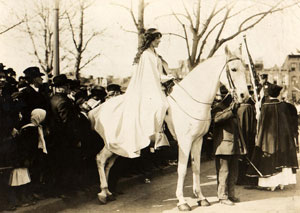
|
 |
TEN REASONS TO VOTE ON THE SECOND TUESDAY IN NOVEMBER |
|
| |
Voting really can affect the fate of our nation and planet for years to come. Whether you are 18 or 81, here are ten reasons why it is worth a few minutes of your time to cast your ballot.
- Your vote counts equally with that of the richest or most powerful person in the nation.
- Voter turnout is rarely more than half of registered voters. A less popular candidate can still get elected if their supporters are better motivated to vote. Even if you feel all the candidates rot, one is usually less rotten than the others.
- There have been cases where significant races have been decided by a handful of votes. In Connecticut in 1994, Sam Gejdenson beat Edward W. Munster (no relation to Herman Munster of Shroudshire) by a mere four votes! In 2006, Joe Courtney unseated Rob Simmons by less than 100 votes. One more vote per precinct in just one state (Florida) would have changed the outcome of the 2000 presidential election.
- Voting is one of the strongest tools citizens have to influence government. This election will impact a number of critical issues, including our environment. Energy policy, climate change, endangered species, pollution control, farming, open space and land use will all be affected by who gets elected.
- Your vote sends a message. Elected officials tend to listen to the majority. Voting also drives elected officials to be accountable to the people whose interests they have been chosen to represent. Elected officials often pay attention to voter turnout. If it is decisively high in some states or towns, candidates and elected officials are more likely to pay more attention to the issues that people in that region care about. For example, candidates who depend on votes from Iowa are more likely to support ethanol subsidies.
- It is your civic duty to vote. As industrialist and philanthropist John D. Rockefeller said, “…every right implies a responsibility, every opportunity an obligation….”
- You can channel your anger, worries and passions into your vote. It will make you feel good – kind of like giving blood.
- You get to cancel out some whacko’s vote. (I’m assuming whackos don’t read my column.)
- It gives you a legitimate right to complain.
- Our forebears gave their lives to give future citizens the right to vote. People around the world are
 |
| Attorney Inez Milholland Boissevain at the National American Woman Suffrage Association parade in Washington D.C. in 1913. She died four years before the end of a 72-year (1848-1920) long battle to allow women to vote . Library of Congress photo. |
still fighting and dying for a privilege that some of us take for granted. Less than 100 years ago in our own country, "Women were spit upon, slapped in the face, tripped up, pelted with burning cigar stubs, and insulted by jeers and obscene language too vile to print or repeat," during a suffrage parade. (Women’s Journal, 03/08/1913)
If you want to base your vote on the facts instead of on rhetoric, there are some good resources out there.
- At www.grist.org/candidate_chart_08.html you can see at a glance where the presidential candidates stand on climate and energy issues.
- Votesmart.org has voting records, public statements, and issue positions on topics like the environment or wildlife issues.
- Fact checking websites focus on holding politicians accountable by sorting through their claims.
- One is factcheck.org, by the Annenberg Public Policy Center of the University of Pennsylvania.
- The St. Petersburg Times site politifact.com sports a “flip-o-meter” and verifies the contents of common “mud in your inbox” chain emails.
And remember, as the public servant William E. Simon said, “Bad politicians are sent to Washington by good people who don't vote.” |
| |
|
| |
|
 |
More Information and References:
|
| |
|

